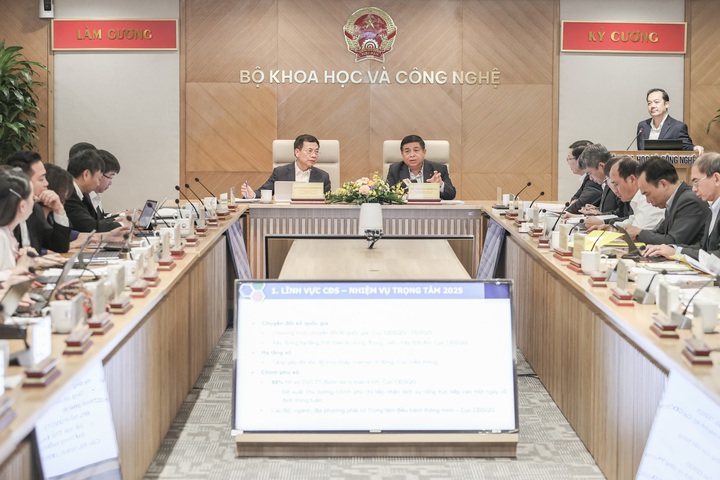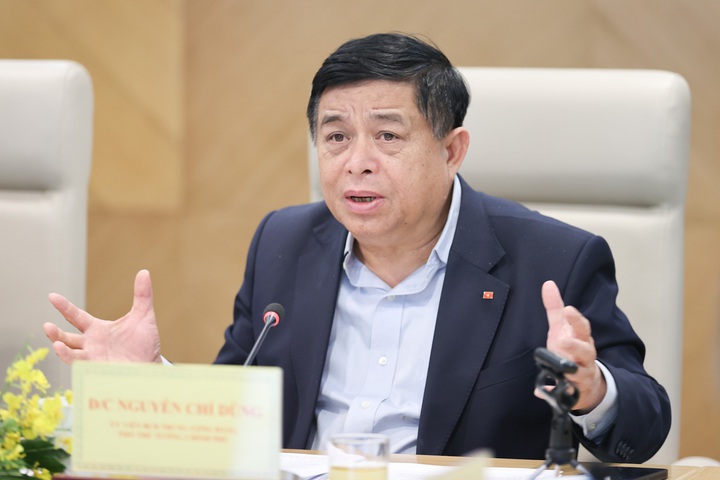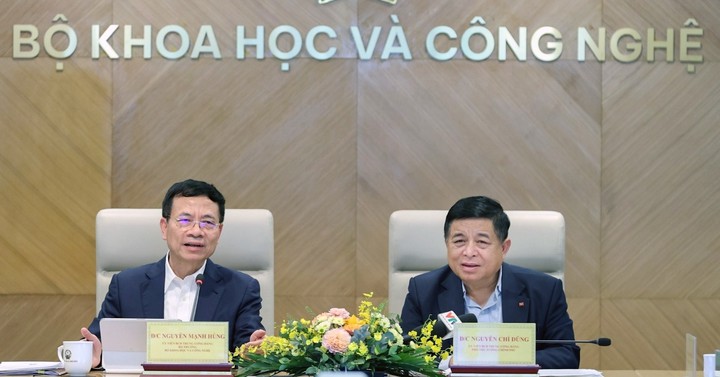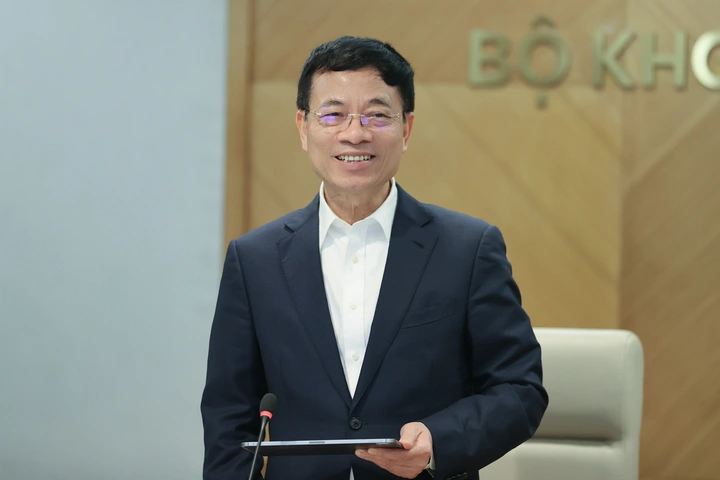During a working session with the Ministry of Science and Technology (MOST), Deputy Prime Minister Nguyen Chi Dung emphasized the Ministry's critical role in the country’s economic development.
The Ministry pledged to take responsibility for contributing at least 5% of Vietnam's annual economic growth.
Making science, technology, and innovation a core engine for economic development

On the afternoon of April 1, Deputy Prime Minister Nguyen Chi Dung, a member of the Party Central Committee, paid a visit to the Ministry of Science and Technology. The session was co-chaired by Minister of Science and Technology Nguyen Manh Hung, also a member of the Party Central Committee.
This marked the first working session between government leadership and the newly merged ministry. Attendees included representatives from various ministries, agencies, institutes, and departments; Deputy Ministers Pham Duc Long, Le Xuan Dinh, Hoang Minh, and Bui Hoang Phuong; and leaders from units and enterprises under the Ministry.
Deputy Prime Minister Nguyen Chi Dung stressed the significance of science, technology, and innovation (STI) in national development. He noted that since the 13th National Party Congress, STI has been identified as a strategic breakthrough driver. “The role of science, technology, and innovation is vital - we have recognized this over many terms. Now, we reaffirm it with stronger reform spirit under Resolution 57,” he said.
He pointed out that as the key force implementing Resolution 57, the Ministry must shift its mindset and methodology, overcoming legal and conceptual constraints to fulfill its mission. Only then can science and innovation truly become the primary drivers of economic growth, helping the country achieve double-digit GDP increases.
Minister Nguyen Manh Hung affirmed the Ministry’s commitment, stating: “The Ministry pledges that if the country grows by 10%, the science and technology sector will be responsible for contributing at least 5%, more than 50% of the target.”
He added that the Ministry’s staff are working tirelessly to implement tasks rapidly and that technology is being leveraged to monitor and accelerate progress.
A new working method under Resolution 57

Deputy Prime Minister Nguyen Chi Dung
This was also the Ministry’s first session reporting to the government under a new working model. Guided by Deputy Prime Minister Dung and Minister Hung, delegates discussed implementation strategies and measurable outcomes for major tasks in 11 key fields to be delivered by 2025.
More than 20 major tasks have been assigned to departments within the Ministry, all designed to contribute significantly to national development. These include building shared AI computing infrastructure, doubling mobile internet speeds, deploying AI virtual assistants for every public servant, developing shared science and technology infrastructure, and resolving all backlogged industrial property applications submitted before 2024.
Each task was detailed by department heads, including goals, timelines, and required support from the Ministry and government. They also pledged to meet deadlines and quality expectations.
For example, the National Digital Transformation Department has been tasked with developing a national AI transformation program. This includes deploying AI across all sectors and within society at large. Deputy Prime Minister Dung highlighted this as a top priority.
Minister Hung emphasized that like the digital transformation strategy launched five years ago, the national AI program must embody the principle of “comprehensive and inclusive” transformation. The signature feature of this program will be ensuring every Vietnamese citizen has access to a Vietnamese-language virtual assistant. The program is scheduled for Prime Ministerial approval by May 2025, with rollout by November 2025.

In the digital economy sphere, the Department of Digital Economy and Society has been assigned to develop a support program for digital transformation among small and medium-sized enterprises, household businesses, and cooperatives. The department has committed to completing this by April 2025.
Deputy Prime Minister Dung suggested setting specific outreach goals, including the number of businesses to be supported, advised, and benefited. Rapid and effective implementation, he said, would enhance competitiveness and yield strong economic returns.
He also recommended using digital platforms to support small businesses in managing finance, HR, and taxes, and encouraging them to formalize as enterprises. This approach blends real-world economic needs with technological innovation to drive national progress.
He emphasized that all Ministry sectors must now shift from input-focused to output-based management. Minister Hung has tasked the Department of Information and Statistics with developing performance evaluation metrics for STI and digital transformation activities. The proposal is due April 7 and will be circulated to relevant ministries for feedback before submission to the Prime Minister by April 21.
Commending the Ministry for its innovative direction aligned with Resolution 57, Deputy Prime Minister Dung remarked, “Today, we’ve focused on key, actionable, and strategic issues that the Ministry can deliver immediately.”
Priority missions ahead
Based on six challenges and five global STI and innovation trends, Deputy Prime Minister Dung outlined key focus areas:
The Ministry must quickly finalize its organizational structure, treating the streamlining as an opportunity to restructure and refine its human resources to meet heavy responsibilities. This should preserve achievements and ensure seamless operations.
It must rigorously implement Party and State directives, especially Resolution 57 of the Politburo, Resolution 193 of the National Assembly, and Government Resolution 03. These should serve as guiding principles, translated into action plans with clear timelines and responsibilities.
The Ministry is also expected to complete legal and policy frameworks to eliminate outdated thinking and barriers to development. It must dismantle the mindset of banning what cannot be controlled and turn policy into a competitive advantage.

Minister of Science and Technology Nguyen Manh Hung
In particular, the Ministry should prioritize drafting five new laws for submission to the National Assembly this year, amending 14 related laws to reflect Resolution 57, finalizing frameworks for national data development, piloting regulatory sandboxes for new technologies, and updating intellectual property law.
Deputy Prime Minister Dung also called for strengthening digital and strategic tech infrastructure, promoting scientific research and high-quality human resource development, especially in core technologies, accelerating innovation and digital transformation in businesses, maximizing international cooperation, and enhancing governance through digital platforms.
In closing, Minister Hung emphasized that the Ministry is ready to take on ambitious, challenging missions focused on results. This approach, he said, will foster new breakthroughs and nurture top talent for the nation.
“All new directions and assignments given by the Deputy Prime Minister will be translated into concrete work with results by 2025. What we’ve committed to will be delivered,” he affirmed./.
